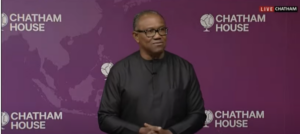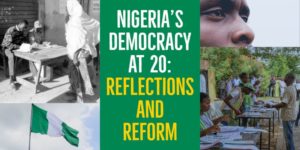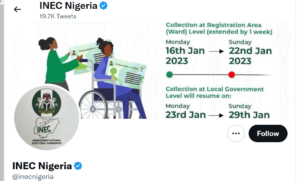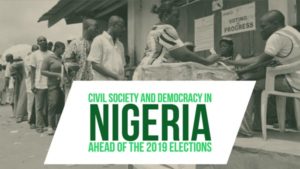The outcome of the election, scheduled for February 25th, will reverberate far beyond Nigeria’s borders, The Economist reports. A free and fair vote in the continent’s biggest democracy would send a telling signal across Africa, where freedom is in retreat in a number of countries after a spate of coups, rigged votes and the abandonment of presidential term limits.
 The Labour Party candidate Peter Obi (right) thinks he can renew Africa’s biggest economy and democracy, it adds.
The Labour Party candidate Peter Obi (right) thinks he can renew Africa’s biggest economy and democracy, it adds.
Thugs attacked a rally of Obi’s supporters last weekend (above), raising fears of electoral violence.
There are five reasons the 2023 elections are unique and critical, says American University’s Carl LeVan:
1. Religion less of a mobilizing force
Nigeria is roughly evenly divided between Muslims and Christians, and religion plays a big role in electoral politics. Religion is often a tool for political mobilization, since northerners are overwhelmingly Muslim and most southerners are Christian. This time around, the candidates from the two major parties are both Muslim, reducing the religious rhetoric on the campaign trail. Bola Tinubu of the APC and Atiku Abubakar of the PDP have therefore focused on other issues – such as insecurity and the economy – to mobilize voters and distinguish themselves from each other.
2. There’s no incumbent
 This is only the second time ever that Nigeria has had a presidential vote without an incumbent running for reelection. This is good for democracy, since it suggests that presidents are yielding to popular support for constitutional term limits. It is certainly an improvement over President Olusegun Obasanjo’s failed attempt in 2006 to change the constitution so he could run for a third term. However, this situation also alters the dynamics of competition. One analysis of 22 years of African elections finds that ruling parties are only half as likely to win when the incumbent president is not in the running. This improves the PDP’s odds.
This is only the second time ever that Nigeria has had a presidential vote without an incumbent running for reelection. This is good for democracy, since it suggests that presidents are yielding to popular support for constitutional term limits. It is certainly an improvement over President Olusegun Obasanjo’s failed attempt in 2006 to change the constitution so he could run for a third term. However, this situation also alters the dynamics of competition. One analysis of 22 years of African elections finds that ruling parties are only half as likely to win when the incumbent president is not in the running. This improves the PDP’s odds.
3. Labour candidate has energized young voters
 Peter Obi, who was Atiku Abubakar’s running mate in 2019, has emerged as a viable third-party candidate from the Labour Party. At 61, he is younger than the two leading candidates and hails from the overwhelming Christian southeast – where ethnic Igbos feel like they have been left out of presidential politics for decades. …While some surveys targeting rural citizens show Obi ahead at the polls, conventional political science suggests he is unlikely to win. But Obi’s momentum has been no surprise to Nigerians under 35, who constitute a staggering 40% of newly registered voters.
Peter Obi, who was Atiku Abubakar’s running mate in 2019, has emerged as a viable third-party candidate from the Labour Party. At 61, he is younger than the two leading candidates and hails from the overwhelming Christian southeast – where ethnic Igbos feel like they have been left out of presidential politics for decades. …While some surveys targeting rural citizens show Obi ahead at the polls, conventional political science suggests he is unlikely to win. But Obi’s momentum has been no surprise to Nigerians under 35, who constitute a staggering 40% of newly registered voters.
4. Violence has spread across the country
 In 2015, a key question for voters was: Which candidate is better suited to end the militant group Boko Haram’s insurgency? Nigerians’ resounding answer then, and again at the 2019 polls, was Muhammadu Buhari. But during Buhari’s two terms, violence escalated and diversified. …According to the Council on Foreign Relations Security Tracker, Nigeria saw about 7,000 violent deaths last year, a decline from roughly 9,000 in 2021. Another credible source, the Armed Conflict Location Event Dataset, reports 10,600 violent deaths in 2022. …Furthermore, both data sources confirm that state attacks on civilians have also increased. Thousands of unarmed young people demonstrating in Lagos for an end to the Special Anti-Robbery Squad SARS were shot at by security forces in October 2020. At least 48 people died in a single day at an #EndSARS protest in Lagos.
In 2015, a key question for voters was: Which candidate is better suited to end the militant group Boko Haram’s insurgency? Nigerians’ resounding answer then, and again at the 2019 polls, was Muhammadu Buhari. But during Buhari’s two terms, violence escalated and diversified. …According to the Council on Foreign Relations Security Tracker, Nigeria saw about 7,000 violent deaths last year, a decline from roughly 9,000 in 2021. Another credible source, the Armed Conflict Location Event Dataset, reports 10,600 violent deaths in 2022. …Furthermore, both data sources confirm that state attacks on civilians have also increased. Thousands of unarmed young people demonstrating in Lagos for an end to the Special Anti-Robbery Squad SARS were shot at by security forces in October 2020. At least 48 people died in a single day at an #EndSARS protest in Lagos.
5. Electoral violence remains a threat
In December, Nigeria’s Electoral Commissioner said there were 50 attacks on their regional offices and other facilities since 2019. Armed Conflict Location Event Dataset data indicates this is a gross underestimate, with the minimum being 134.







